Laurence Graff's Entrepreneurial Journey
VerifiedAdded on 2020/06/04
|12
|3786
|126
AI Summary
This assignment examines the success story of Laurence Graff, a prominent figure in the diamond industry. It delves into his early life experiences, highlighting his practical approach and customer-centric mindset fostered by his family background. The analysis emphasizes Graff's entrepreneurial spirit, innovative practices in diamond quality and polishing, and the factors contributing to his remarkable wealth and global recognition.
Contribute Materials
Your contribution can guide someone’s learning journey. Share your
documents today.

ESBM
Secure Best Marks with AI Grader
Need help grading? Try our AI Grader for instant feedback on your assignments.

TABLE OF CONTENTS
INTRODUCTION...........................................................................................................................1
P1 Types of Entrepreneurial ventures and typology of entrepreneurship..............................1
P2 Similarities and differences between Entrepreneurial ventures........................................3
P3 Statistics related to SME in economy...............................................................................4
P4 Importance of small businesses and start-ups in economy...............................................5
P5 Successful Entrepreneur with examples............................................................................6
P6 How personality reflects Entrepreneurial motivation.......................................................7
P7 How background and experience can foster entrepreneurship..........................................7
CONCLUSION................................................................................................................................9
REFERENCES..............................................................................................................................10
INTRODUCTION...........................................................................................................................1
P1 Types of Entrepreneurial ventures and typology of entrepreneurship..............................1
P2 Similarities and differences between Entrepreneurial ventures........................................3
P3 Statistics related to SME in economy...............................................................................4
P4 Importance of small businesses and start-ups in economy...............................................5
P5 Successful Entrepreneur with examples............................................................................6
P6 How personality reflects Entrepreneurial motivation.......................................................7
P7 How background and experience can foster entrepreneurship..........................................7
CONCLUSION................................................................................................................................9
REFERENCES..............................................................................................................................10
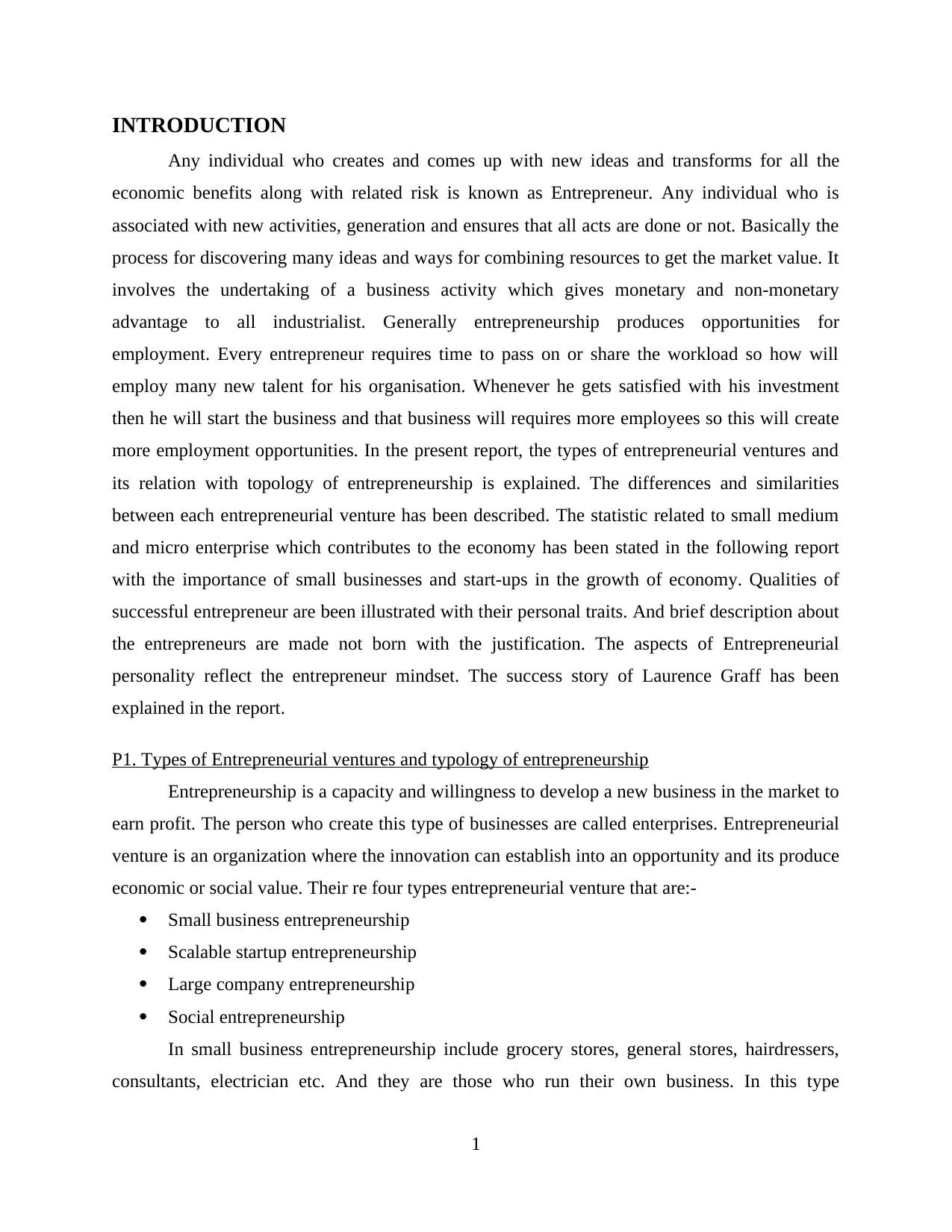
INTRODUCTION
Any individual who creates and comes up with new ideas and transforms for all the
economic benefits along with related risk is known as Entrepreneur. Any individual who is
associated with new activities, generation and ensures that all acts are done or not. Basically the
process for discovering many ideas and ways for combining resources to get the market value. It
involves the undertaking of a business activity which gives monetary and non-monetary
advantage to all industrialist. Generally entrepreneurship produces opportunities for
employment. Every entrepreneur requires time to pass on or share the workload so how will
employ many new talent for his organisation. Whenever he gets satisfied with his investment
then he will start the business and that business will requires more employees so this will create
more employment opportunities. In the present report, the types of entrepreneurial ventures and
its relation with topology of entrepreneurship is explained. The differences and similarities
between each entrepreneurial venture has been described. The statistic related to small medium
and micro enterprise which contributes to the economy has been stated in the following report
with the importance of small businesses and start-ups in the growth of economy. Qualities of
successful entrepreneur are been illustrated with their personal traits. And brief description about
the entrepreneurs are made not born with the justification. The aspects of Entrepreneurial
personality reflect the entrepreneur mindset. The success story of Laurence Graff has been
explained in the report.
P1. Types of Entrepreneurial ventures and typology of entrepreneurship
Entrepreneurship is a capacity and willingness to develop a new business in the market to
earn profit. The person who create this type of businesses are called enterprises. Entrepreneurial
venture is an organization where the innovation can establish into an opportunity and its produce
economic or social value. Their re four types entrepreneurial venture that are:-
Small business entrepreneurship
Scalable startup entrepreneurship
Large company entrepreneurship
Social entrepreneurship
In small business entrepreneurship include grocery stores, general stores, hairdressers,
consultants, electrician etc. And they are those who run their own business. In this type
1
Any individual who creates and comes up with new ideas and transforms for all the
economic benefits along with related risk is known as Entrepreneur. Any individual who is
associated with new activities, generation and ensures that all acts are done or not. Basically the
process for discovering many ideas and ways for combining resources to get the market value. It
involves the undertaking of a business activity which gives monetary and non-monetary
advantage to all industrialist. Generally entrepreneurship produces opportunities for
employment. Every entrepreneur requires time to pass on or share the workload so how will
employ many new talent for his organisation. Whenever he gets satisfied with his investment
then he will start the business and that business will requires more employees so this will create
more employment opportunities. In the present report, the types of entrepreneurial ventures and
its relation with topology of entrepreneurship is explained. The differences and similarities
between each entrepreneurial venture has been described. The statistic related to small medium
and micro enterprise which contributes to the economy has been stated in the following report
with the importance of small businesses and start-ups in the growth of economy. Qualities of
successful entrepreneur are been illustrated with their personal traits. And brief description about
the entrepreneurs are made not born with the justification. The aspects of Entrepreneurial
personality reflect the entrepreneur mindset. The success story of Laurence Graff has been
explained in the report.
P1. Types of Entrepreneurial ventures and typology of entrepreneurship
Entrepreneurship is a capacity and willingness to develop a new business in the market to
earn profit. The person who create this type of businesses are called enterprises. Entrepreneurial
venture is an organization where the innovation can establish into an opportunity and its produce
economic or social value. Their re four types entrepreneurial venture that are:-
Small business entrepreneurship
Scalable startup entrepreneurship
Large company entrepreneurship
Social entrepreneurship
In small business entrepreneurship include grocery stores, general stores, hairdressers,
consultants, electrician etc. And they are those who run their own business. In this type
1
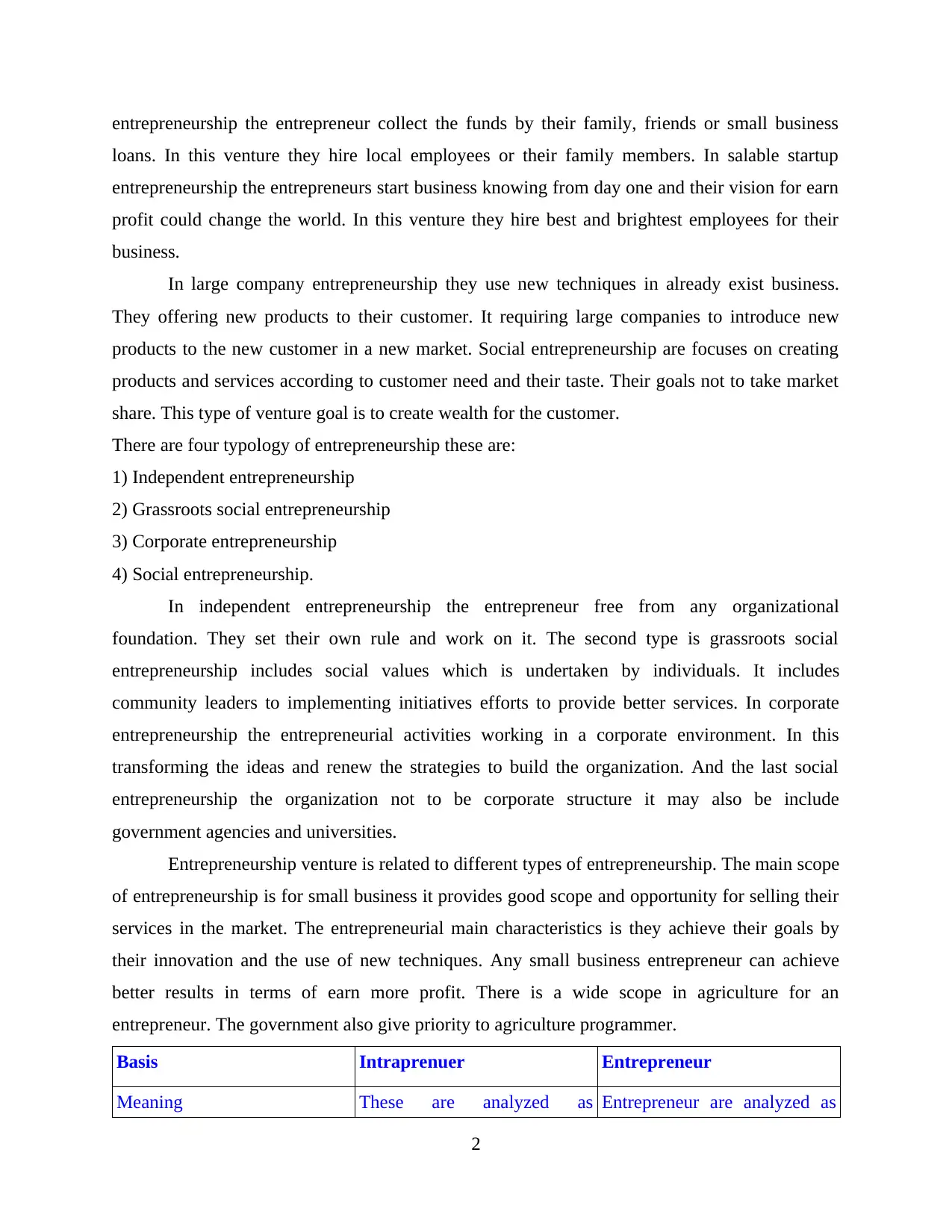
entrepreneurship the entrepreneur collect the funds by their family, friends or small business
loans. In this venture they hire local employees or their family members. In salable startup
entrepreneurship the entrepreneurs start business knowing from day one and their vision for earn
profit could change the world. In this venture they hire best and brightest employees for their
business.
In large company entrepreneurship they use new techniques in already exist business.
They offering new products to their customer. It requiring large companies to introduce new
products to the new customer in a new market. Social entrepreneurship are focuses on creating
products and services according to customer need and their taste. Their goals not to take market
share. This type of venture goal is to create wealth for the customer.
There are four typology of entrepreneurship these are:
1) Independent entrepreneurship
2) Grassroots social entrepreneurship
3) Corporate entrepreneurship
4) Social entrepreneurship.
In independent entrepreneurship the entrepreneur free from any organizational
foundation. They set their own rule and work on it. The second type is grassroots social
entrepreneurship includes social values which is undertaken by individuals. It includes
community leaders to implementing initiatives efforts to provide better services. In corporate
entrepreneurship the entrepreneurial activities working in a corporate environment. In this
transforming the ideas and renew the strategies to build the organization. And the last social
entrepreneurship the organization not to be corporate structure it may also be include
government agencies and universities.
Entrepreneurship venture is related to different types of entrepreneurship. The main scope
of entrepreneurship is for small business it provides good scope and opportunity for selling their
services in the market. The entrepreneurial main characteristics is they achieve their goals by
their innovation and the use of new techniques. Any small business entrepreneur can achieve
better results in terms of earn more profit. There is a wide scope in agriculture for an
entrepreneur. The government also give priority to agriculture programmer.
Basis Intraprenuer Entrepreneur
Meaning These are analyzed as Entrepreneur are analyzed as
2
loans. In this venture they hire local employees or their family members. In salable startup
entrepreneurship the entrepreneurs start business knowing from day one and their vision for earn
profit could change the world. In this venture they hire best and brightest employees for their
business.
In large company entrepreneurship they use new techniques in already exist business.
They offering new products to their customer. It requiring large companies to introduce new
products to the new customer in a new market. Social entrepreneurship are focuses on creating
products and services according to customer need and their taste. Their goals not to take market
share. This type of venture goal is to create wealth for the customer.
There are four typology of entrepreneurship these are:
1) Independent entrepreneurship
2) Grassroots social entrepreneurship
3) Corporate entrepreneurship
4) Social entrepreneurship.
In independent entrepreneurship the entrepreneur free from any organizational
foundation. They set their own rule and work on it. The second type is grassroots social
entrepreneurship includes social values which is undertaken by individuals. It includes
community leaders to implementing initiatives efforts to provide better services. In corporate
entrepreneurship the entrepreneurial activities working in a corporate environment. In this
transforming the ideas and renew the strategies to build the organization. And the last social
entrepreneurship the organization not to be corporate structure it may also be include
government agencies and universities.
Entrepreneurship venture is related to different types of entrepreneurship. The main scope
of entrepreneurship is for small business it provides good scope and opportunity for selling their
services in the market. The entrepreneurial main characteristics is they achieve their goals by
their innovation and the use of new techniques. Any small business entrepreneur can achieve
better results in terms of earn more profit. There is a wide scope in agriculture for an
entrepreneur. The government also give priority to agriculture programmer.
Basis Intraprenuer Entrepreneur
Meaning These are analyzed as Entrepreneur are analyzed as
2
Secure Best Marks with AI Grader
Need help grading? Try our AI Grader for instant feedback on your assignments.
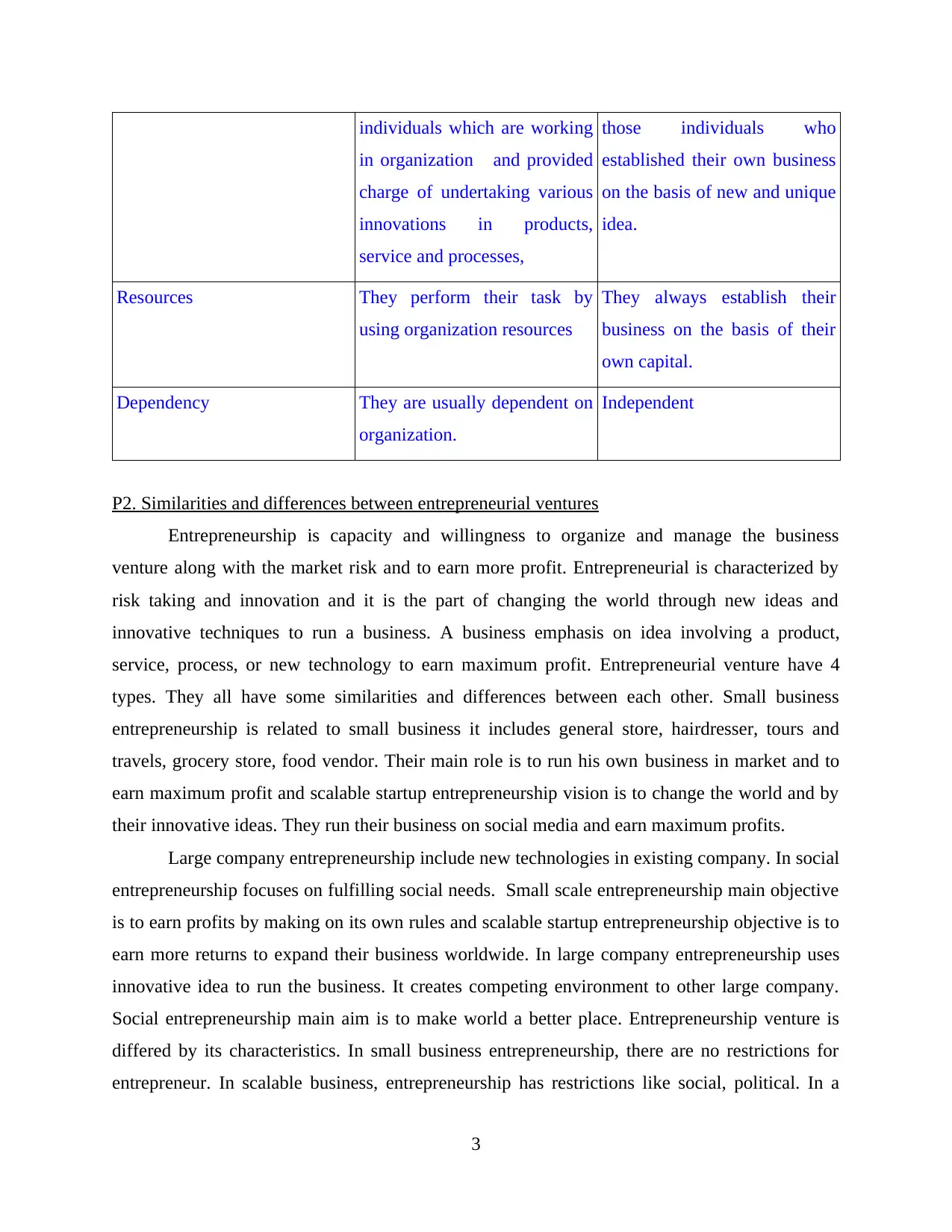
individuals which are working
in organization and provided
charge of undertaking various
innovations in products,
service and processes,
those individuals who
established their own business
on the basis of new and unique
idea.
Resources They perform their task by
using organization resources
They always establish their
business on the basis of their
own capital.
Dependency They are usually dependent on
organization.
Independent
P2. Similarities and differences between entrepreneurial ventures
Entrepreneurship is capacity and willingness to organize and manage the business
venture along with the market risk and to earn more profit. Entrepreneurial is characterized by
risk taking and innovation and it is the part of changing the world through new ideas and
innovative techniques to run a business. A business emphasis on idea involving a product,
service, process, or new technology to earn maximum profit. Entrepreneurial venture have 4
types. They all have some similarities and differences between each other. Small business
entrepreneurship is related to small business it includes general store, hairdresser, tours and
travels, grocery store, food vendor. Their main role is to run his own business in market and to
earn maximum profit and scalable startup entrepreneurship vision is to change the world and by
their innovative ideas. They run their business on social media and earn maximum profits.
Large company entrepreneurship include new technologies in existing company. In social
entrepreneurship focuses on fulfilling social needs. Small scale entrepreneurship main objective
is to earn profits by making on its own rules and scalable startup entrepreneurship objective is to
earn more returns to expand their business worldwide. In large company entrepreneurship uses
innovative idea to run the business. It creates competing environment to other large company.
Social entrepreneurship main aim is to make world a better place. Entrepreneurship venture is
differed by its characteristics. In small business entrepreneurship, there are no restrictions for
entrepreneur. In scalable business, entrepreneurship has restrictions like social, political. In a
3
in organization and provided
charge of undertaking various
innovations in products,
service and processes,
those individuals who
established their own business
on the basis of new and unique
idea.
Resources They perform their task by
using organization resources
They always establish their
business on the basis of their
own capital.
Dependency They are usually dependent on
organization.
Independent
P2. Similarities and differences between entrepreneurial ventures
Entrepreneurship is capacity and willingness to organize and manage the business
venture along with the market risk and to earn more profit. Entrepreneurial is characterized by
risk taking and innovation and it is the part of changing the world through new ideas and
innovative techniques to run a business. A business emphasis on idea involving a product,
service, process, or new technology to earn maximum profit. Entrepreneurial venture have 4
types. They all have some similarities and differences between each other. Small business
entrepreneurship is related to small business it includes general store, hairdresser, tours and
travels, grocery store, food vendor. Their main role is to run his own business in market and to
earn maximum profit and scalable startup entrepreneurship vision is to change the world and by
their innovative ideas. They run their business on social media and earn maximum profits.
Large company entrepreneurship include new technologies in existing company. In social
entrepreneurship focuses on fulfilling social needs. Small scale entrepreneurship main objective
is to earn profits by making on its own rules and scalable startup entrepreneurship objective is to
earn more returns to expand their business worldwide. In large company entrepreneurship uses
innovative idea to run the business. It creates competing environment to other large company.
Social entrepreneurship main aim is to make world a better place. Entrepreneurship venture is
differed by its characteristics. In small business entrepreneurship, there are no restrictions for
entrepreneur. In scalable business, entrepreneurship has restrictions like social, political. In a
3
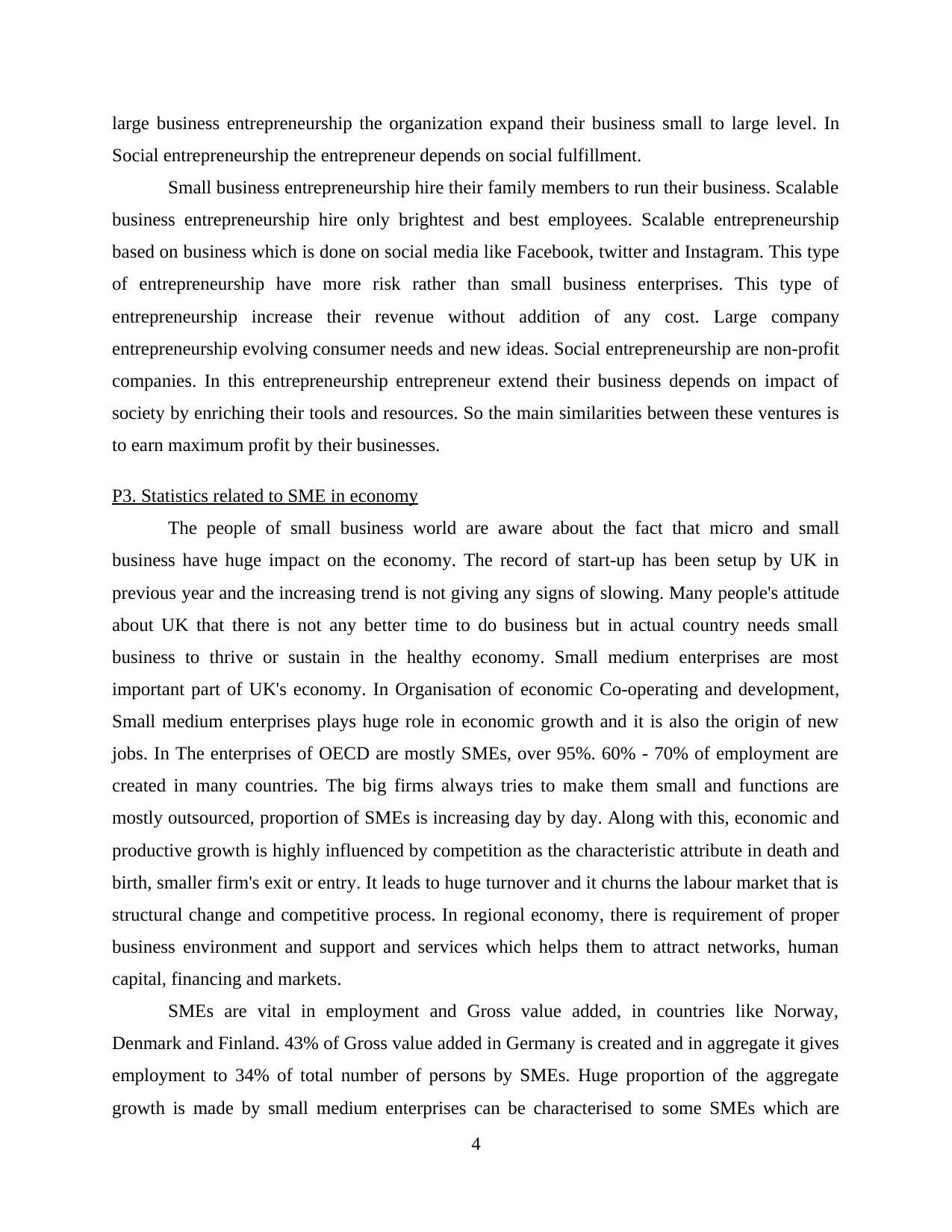
large business entrepreneurship the organization expand their business small to large level. In
Social entrepreneurship the entrepreneur depends on social fulfillment.
Small business entrepreneurship hire their family members to run their business. Scalable
business entrepreneurship hire only brightest and best employees. Scalable entrepreneurship
based on business which is done on social media like Facebook, twitter and Instagram. This type
of entrepreneurship have more risk rather than small business enterprises. This type of
entrepreneurship increase their revenue without addition of any cost. Large company
entrepreneurship evolving consumer needs and new ideas. Social entrepreneurship are non-profit
companies. In this entrepreneurship entrepreneur extend their business depends on impact of
society by enriching their tools and resources. So the main similarities between these ventures is
to earn maximum profit by their businesses.
P3. Statistics related to SME in economy
The people of small business world are aware about the fact that micro and small
business have huge impact on the economy. The record of start-up has been setup by UK in
previous year and the increasing trend is not giving any signs of slowing. Many people's attitude
about UK that there is not any better time to do business but in actual country needs small
business to thrive or sustain in the healthy economy. Small medium enterprises are most
important part of UK's economy. In Organisation of economic Co-operating and development,
Small medium enterprises plays huge role in economic growth and it is also the origin of new
jobs. In The enterprises of OECD are mostly SMEs, over 95%. 60% - 70% of employment are
created in many countries. The big firms always tries to make them small and functions are
mostly outsourced, proportion of SMEs is increasing day by day. Along with this, economic and
productive growth is highly influenced by competition as the characteristic attribute in death and
birth, smaller firm's exit or entry. It leads to huge turnover and it churns the labour market that is
structural change and competitive process. In regional economy, there is requirement of proper
business environment and support and services which helps them to attract networks, human
capital, financing and markets.
SMEs are vital in employment and Gross value added, in countries like Norway,
Denmark and Finland. 43% of Gross value added in Germany is created and in aggregate it gives
employment to 34% of total number of persons by SMEs. Huge proportion of the aggregate
growth is made by small medium enterprises can be characterised to some SMEs which are
4
Social entrepreneurship the entrepreneur depends on social fulfillment.
Small business entrepreneurship hire their family members to run their business. Scalable
business entrepreneurship hire only brightest and best employees. Scalable entrepreneurship
based on business which is done on social media like Facebook, twitter and Instagram. This type
of entrepreneurship have more risk rather than small business enterprises. This type of
entrepreneurship increase their revenue without addition of any cost. Large company
entrepreneurship evolving consumer needs and new ideas. Social entrepreneurship are non-profit
companies. In this entrepreneurship entrepreneur extend their business depends on impact of
society by enriching their tools and resources. So the main similarities between these ventures is
to earn maximum profit by their businesses.
P3. Statistics related to SME in economy
The people of small business world are aware about the fact that micro and small
business have huge impact on the economy. The record of start-up has been setup by UK in
previous year and the increasing trend is not giving any signs of slowing. Many people's attitude
about UK that there is not any better time to do business but in actual country needs small
business to thrive or sustain in the healthy economy. Small medium enterprises are most
important part of UK's economy. In Organisation of economic Co-operating and development,
Small medium enterprises plays huge role in economic growth and it is also the origin of new
jobs. In The enterprises of OECD are mostly SMEs, over 95%. 60% - 70% of employment are
created in many countries. The big firms always tries to make them small and functions are
mostly outsourced, proportion of SMEs is increasing day by day. Along with this, economic and
productive growth is highly influenced by competition as the characteristic attribute in death and
birth, smaller firm's exit or entry. It leads to huge turnover and it churns the labour market that is
structural change and competitive process. In regional economy, there is requirement of proper
business environment and support and services which helps them to attract networks, human
capital, financing and markets.
SMEs are vital in employment and Gross value added, in countries like Norway,
Denmark and Finland. 43% of Gross value added in Germany is created and in aggregate it gives
employment to 34% of total number of persons by SMEs. Huge proportion of the aggregate
growth is made by small medium enterprises can be characterised to some SMEs which are
4
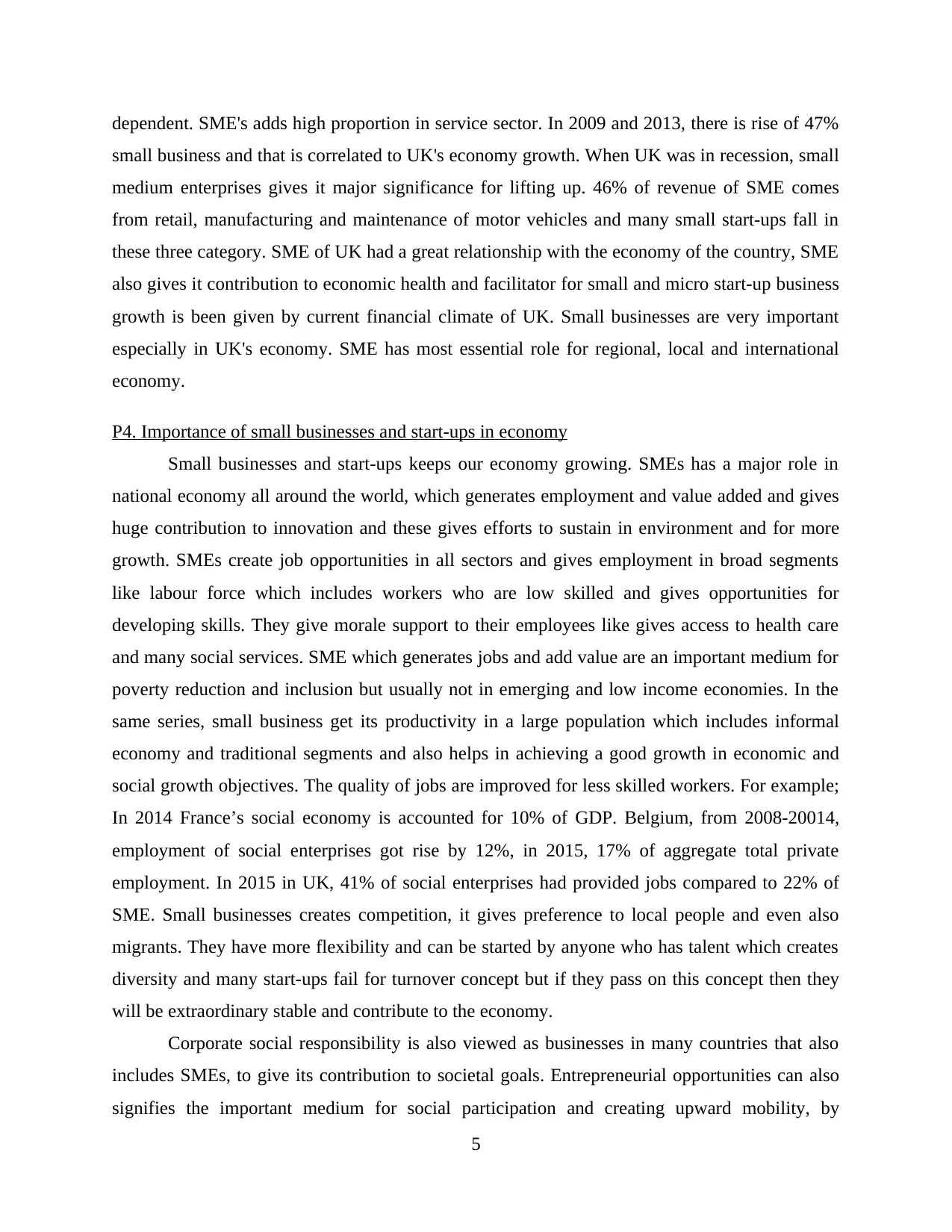
dependent. SME's adds high proportion in service sector. In 2009 and 2013, there is rise of 47%
small business and that is correlated to UK's economy growth. When UK was in recession, small
medium enterprises gives it major significance for lifting up. 46% of revenue of SME comes
from retail, manufacturing and maintenance of motor vehicles and many small start-ups fall in
these three category. SME of UK had a great relationship with the economy of the country, SME
also gives it contribution to economic health and facilitator for small and micro start-up business
growth is been given by current financial climate of UK. Small businesses are very important
especially in UK's economy. SME has most essential role for regional, local and international
economy.
P4. Importance of small businesses and start-ups in economy
Small businesses and start-ups keeps our economy growing. SMEs has a major role in
national economy all around the world, which generates employment and value added and gives
huge contribution to innovation and these gives efforts to sustain in environment and for more
growth. SMEs create job opportunities in all sectors and gives employment in broad segments
like labour force which includes workers who are low skilled and gives opportunities for
developing skills. They give morale support to their employees like gives access to health care
and many social services. SME which generates jobs and add value are an important medium for
poverty reduction and inclusion but usually not in emerging and low income economies. In the
same series, small business get its productivity in a large population which includes informal
economy and traditional segments and also helps in achieving a good growth in economic and
social growth objectives. The quality of jobs are improved for less skilled workers. For example;
In 2014 France’s social economy is accounted for 10% of GDP. Belgium, from 2008-20014,
employment of social enterprises got rise by 12%, in 2015, 17% of aggregate total private
employment. In 2015 in UK, 41% of social enterprises had provided jobs compared to 22% of
SME. Small businesses creates competition, it gives preference to local people and even also
migrants. They have more flexibility and can be started by anyone who has talent which creates
diversity and many start-ups fail for turnover concept but if they pass on this concept then they
will be extraordinary stable and contribute to the economy.
Corporate social responsibility is also viewed as businesses in many countries that also
includes SMEs, to give its contribution to societal goals. Entrepreneurial opportunities can also
signifies the important medium for social participation and creating upward mobility, by
5
small business and that is correlated to UK's economy growth. When UK was in recession, small
medium enterprises gives it major significance for lifting up. 46% of revenue of SME comes
from retail, manufacturing and maintenance of motor vehicles and many small start-ups fall in
these three category. SME of UK had a great relationship with the economy of the country, SME
also gives it contribution to economic health and facilitator for small and micro start-up business
growth is been given by current financial climate of UK. Small businesses are very important
especially in UK's economy. SME has most essential role for regional, local and international
economy.
P4. Importance of small businesses and start-ups in economy
Small businesses and start-ups keeps our economy growing. SMEs has a major role in
national economy all around the world, which generates employment and value added and gives
huge contribution to innovation and these gives efforts to sustain in environment and for more
growth. SMEs create job opportunities in all sectors and gives employment in broad segments
like labour force which includes workers who are low skilled and gives opportunities for
developing skills. They give morale support to their employees like gives access to health care
and many social services. SME which generates jobs and add value are an important medium for
poverty reduction and inclusion but usually not in emerging and low income economies. In the
same series, small business get its productivity in a large population which includes informal
economy and traditional segments and also helps in achieving a good growth in economic and
social growth objectives. The quality of jobs are improved for less skilled workers. For example;
In 2014 France’s social economy is accounted for 10% of GDP. Belgium, from 2008-20014,
employment of social enterprises got rise by 12%, in 2015, 17% of aggregate total private
employment. In 2015 in UK, 41% of social enterprises had provided jobs compared to 22% of
SME. Small businesses creates competition, it gives preference to local people and even also
migrants. They have more flexibility and can be started by anyone who has talent which creates
diversity and many start-ups fail for turnover concept but if they pass on this concept then they
will be extraordinary stable and contribute to the economy.
Corporate social responsibility is also viewed as businesses in many countries that also
includes SMEs, to give its contribution to societal goals. Entrepreneurial opportunities can also
signifies the important medium for social participation and creating upward mobility, by
5
Paraphrase This Document
Need a fresh take? Get an instant paraphrase of this document with our AI Paraphraser
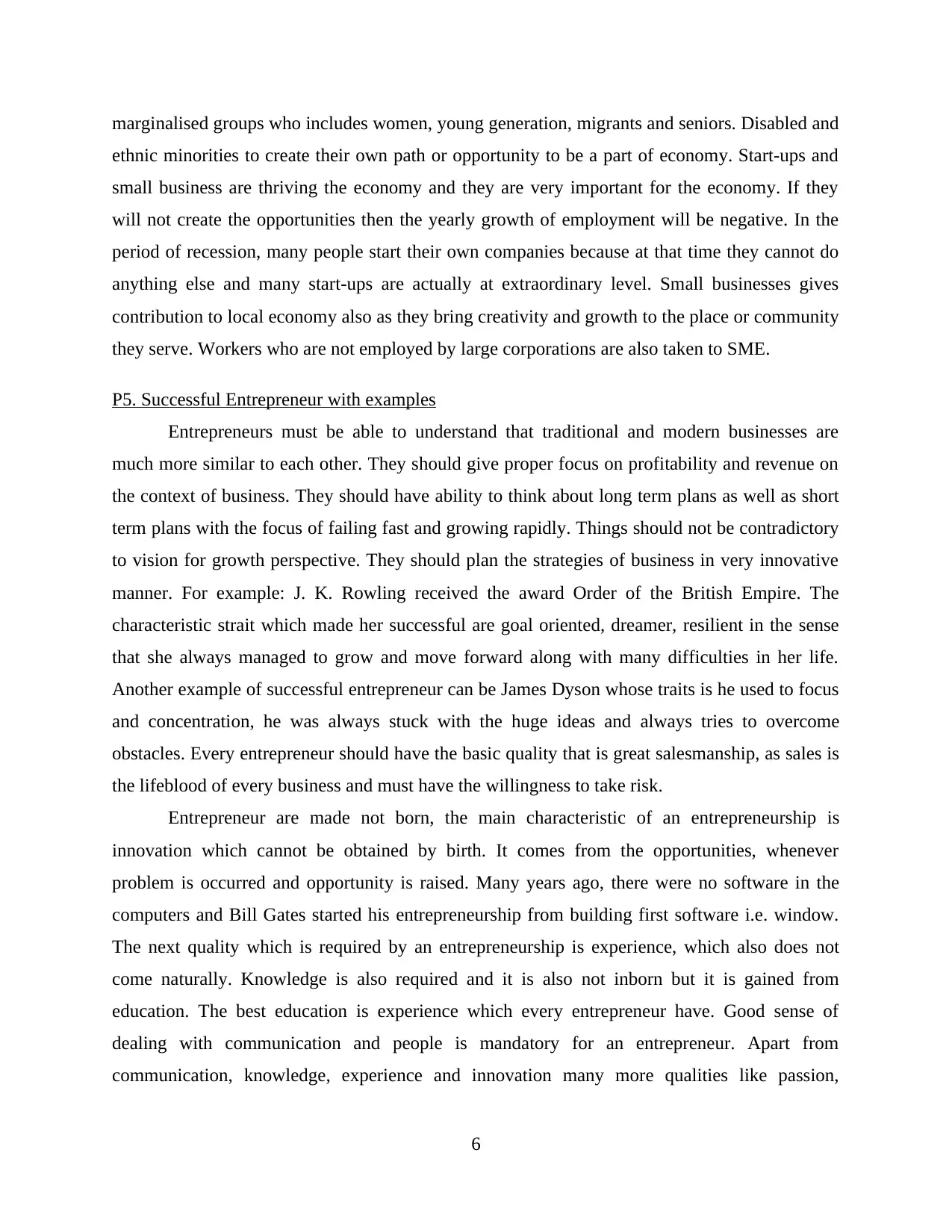
marginalised groups who includes women, young generation, migrants and seniors. Disabled and
ethnic minorities to create their own path or opportunity to be a part of economy. Start-ups and
small business are thriving the economy and they are very important for the economy. If they
will not create the opportunities then the yearly growth of employment will be negative. In the
period of recession, many people start their own companies because at that time they cannot do
anything else and many start-ups are actually at extraordinary level. Small businesses gives
contribution to local economy also as they bring creativity and growth to the place or community
they serve. Workers who are not employed by large corporations are also taken to SME.
P5. Successful Entrepreneur with examples
Entrepreneurs must be able to understand that traditional and modern businesses are
much more similar to each other. They should give proper focus on profitability and revenue on
the context of business. They should have ability to think about long term plans as well as short
term plans with the focus of failing fast and growing rapidly. Things should not be contradictory
to vision for growth perspective. They should plan the strategies of business in very innovative
manner. For example: J. K. Rowling received the award Order of the British Empire. The
characteristic strait which made her successful are goal oriented, dreamer, resilient in the sense
that she always managed to grow and move forward along with many difficulties in her life.
Another example of successful entrepreneur can be James Dyson whose traits is he used to focus
and concentration, he was always stuck with the huge ideas and always tries to overcome
obstacles. Every entrepreneur should have the basic quality that is great salesmanship, as sales is
the lifeblood of every business and must have the willingness to take risk.
Entrepreneur are made not born, the main characteristic of an entrepreneurship is
innovation which cannot be obtained by birth. It comes from the opportunities, whenever
problem is occurred and opportunity is raised. Many years ago, there were no software in the
computers and Bill Gates started his entrepreneurship from building first software i.e. window.
The next quality which is required by an entrepreneurship is experience, which also does not
come naturally. Knowledge is also required and it is also not inborn but it is gained from
education. The best education is experience which every entrepreneur have. Good sense of
dealing with communication and people is mandatory for an entrepreneur. Apart from
communication, knowledge, experience and innovation many more qualities like passion,
6
ethnic minorities to create their own path or opportunity to be a part of economy. Start-ups and
small business are thriving the economy and they are very important for the economy. If they
will not create the opportunities then the yearly growth of employment will be negative. In the
period of recession, many people start their own companies because at that time they cannot do
anything else and many start-ups are actually at extraordinary level. Small businesses gives
contribution to local economy also as they bring creativity and growth to the place or community
they serve. Workers who are not employed by large corporations are also taken to SME.
P5. Successful Entrepreneur with examples
Entrepreneurs must be able to understand that traditional and modern businesses are
much more similar to each other. They should give proper focus on profitability and revenue on
the context of business. They should have ability to think about long term plans as well as short
term plans with the focus of failing fast and growing rapidly. Things should not be contradictory
to vision for growth perspective. They should plan the strategies of business in very innovative
manner. For example: J. K. Rowling received the award Order of the British Empire. The
characteristic strait which made her successful are goal oriented, dreamer, resilient in the sense
that she always managed to grow and move forward along with many difficulties in her life.
Another example of successful entrepreneur can be James Dyson whose traits is he used to focus
and concentration, he was always stuck with the huge ideas and always tries to overcome
obstacles. Every entrepreneur should have the basic quality that is great salesmanship, as sales is
the lifeblood of every business and must have the willingness to take risk.
Entrepreneur are made not born, the main characteristic of an entrepreneurship is
innovation which cannot be obtained by birth. It comes from the opportunities, whenever
problem is occurred and opportunity is raised. Many years ago, there were no software in the
computers and Bill Gates started his entrepreneurship from building first software i.e. window.
The next quality which is required by an entrepreneurship is experience, which also does not
come naturally. Knowledge is also required and it is also not inborn but it is gained from
education. The best education is experience which every entrepreneur have. Good sense of
dealing with communication and people is mandatory for an entrepreneur. Apart from
communication, knowledge, experience and innovation many more qualities like passion,
6
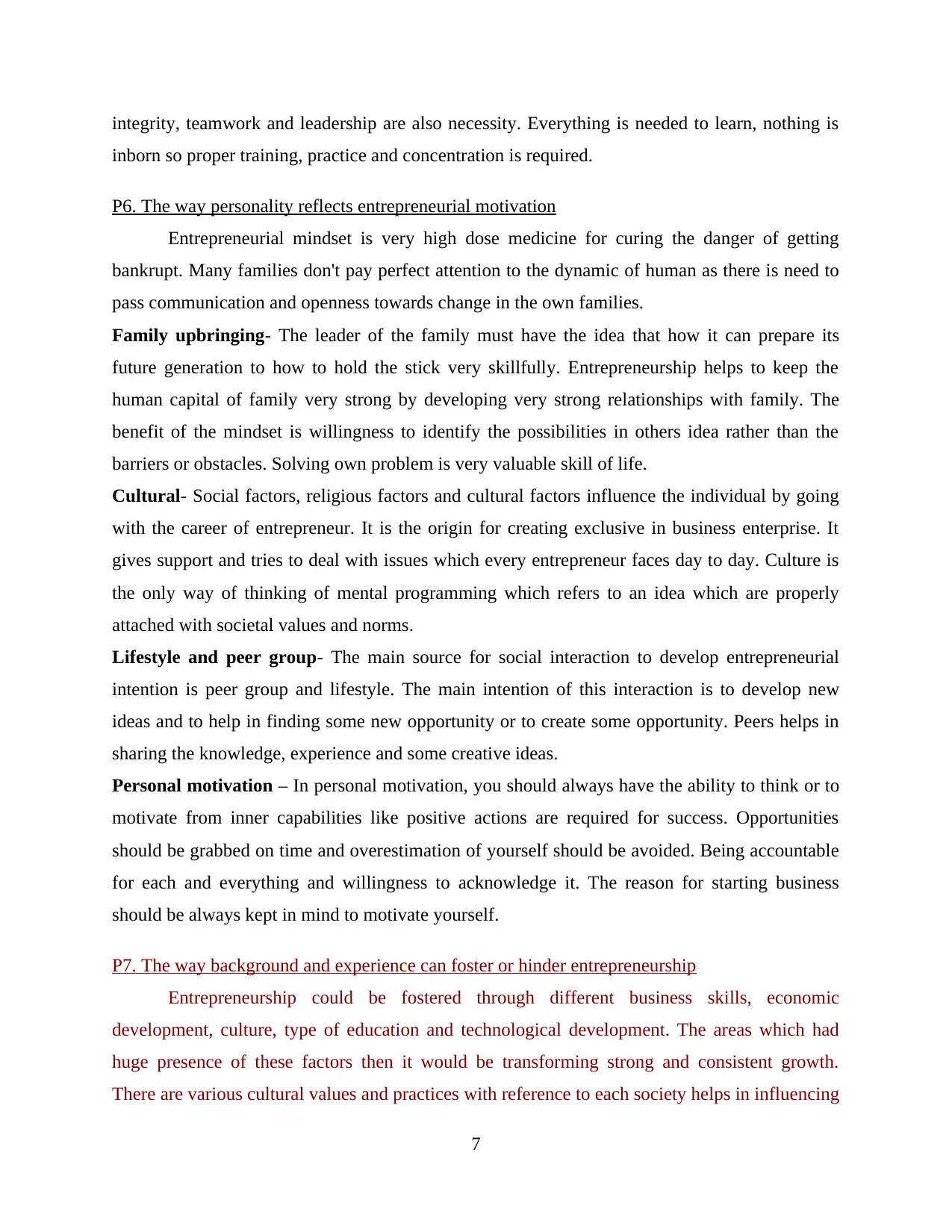
integrity, teamwork and leadership are also necessity. Everything is needed to learn, nothing is
inborn so proper training, practice and concentration is required.
P6. The way personality reflects entrepreneurial motivation
Entrepreneurial mindset is very high dose medicine for curing the danger of getting
bankrupt. Many families don't pay perfect attention to the dynamic of human as there is need to
pass communication and openness towards change in the own families.
Family upbringing- The leader of the family must have the idea that how it can prepare its
future generation to how to hold the stick very skillfully. Entrepreneurship helps to keep the
human capital of family very strong by developing very strong relationships with family. The
benefit of the mindset is willingness to identify the possibilities in others idea rather than the
barriers or obstacles. Solving own problem is very valuable skill of life.
Cultural- Social factors, religious factors and cultural factors influence the individual by going
with the career of entrepreneur. It is the origin for creating exclusive in business enterprise. It
gives support and tries to deal with issues which every entrepreneur faces day to day. Culture is
the only way of thinking of mental programming which refers to an idea which are properly
attached with societal values and norms.
Lifestyle and peer group- The main source for social interaction to develop entrepreneurial
intention is peer group and lifestyle. The main intention of this interaction is to develop new
ideas and to help in finding some new opportunity or to create some opportunity. Peers helps in
sharing the knowledge, experience and some creative ideas.
Personal motivation – In personal motivation, you should always have the ability to think or to
motivate from inner capabilities like positive actions are required for success. Opportunities
should be grabbed on time and overestimation of yourself should be avoided. Being accountable
for each and everything and willingness to acknowledge it. The reason for starting business
should be always kept in mind to motivate yourself.
P7. The way background and experience can foster or hinder entrepreneurship
Entrepreneurship could be fostered through different business skills, economic
development, culture, type of education and technological development. The areas which had
huge presence of these factors then it would be transforming strong and consistent growth.
There are various cultural values and practices with reference to each society helps in influencing
7
inborn so proper training, practice and concentration is required.
P6. The way personality reflects entrepreneurial motivation
Entrepreneurial mindset is very high dose medicine for curing the danger of getting
bankrupt. Many families don't pay perfect attention to the dynamic of human as there is need to
pass communication and openness towards change in the own families.
Family upbringing- The leader of the family must have the idea that how it can prepare its
future generation to how to hold the stick very skillfully. Entrepreneurship helps to keep the
human capital of family very strong by developing very strong relationships with family. The
benefit of the mindset is willingness to identify the possibilities in others idea rather than the
barriers or obstacles. Solving own problem is very valuable skill of life.
Cultural- Social factors, religious factors and cultural factors influence the individual by going
with the career of entrepreneur. It is the origin for creating exclusive in business enterprise. It
gives support and tries to deal with issues which every entrepreneur faces day to day. Culture is
the only way of thinking of mental programming which refers to an idea which are properly
attached with societal values and norms.
Lifestyle and peer group- The main source for social interaction to develop entrepreneurial
intention is peer group and lifestyle. The main intention of this interaction is to develop new
ideas and to help in finding some new opportunity or to create some opportunity. Peers helps in
sharing the knowledge, experience and some creative ideas.
Personal motivation – In personal motivation, you should always have the ability to think or to
motivate from inner capabilities like positive actions are required for success. Opportunities
should be grabbed on time and overestimation of yourself should be avoided. Being accountable
for each and everything and willingness to acknowledge it. The reason for starting business
should be always kept in mind to motivate yourself.
P7. The way background and experience can foster or hinder entrepreneurship
Entrepreneurship could be fostered through different business skills, economic
development, culture, type of education and technological development. The areas which had
huge presence of these factors then it would be transforming strong and consistent growth.
There are various cultural values and practices with reference to each society helps in influencing
7
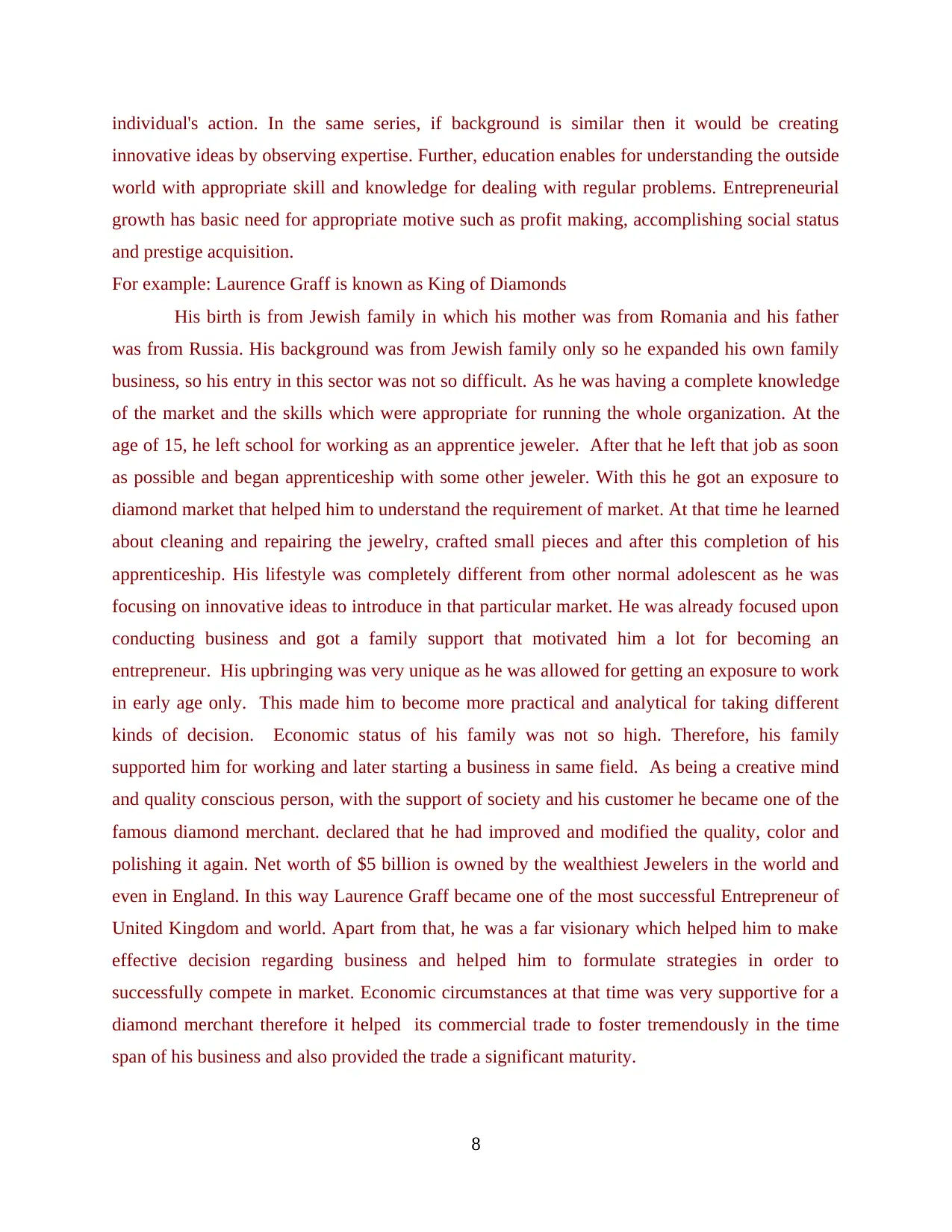
individual's action. In the same series, if background is similar then it would be creating
innovative ideas by observing expertise. Further, education enables for understanding the outside
world with appropriate skill and knowledge for dealing with regular problems. Entrepreneurial
growth has basic need for appropriate motive such as profit making, accomplishing social status
and prestige acquisition.
For example: Laurence Graff is known as King of Diamonds
His birth is from Jewish family in which his mother was from Romania and his father
was from Russia. His background was from Jewish family only so he expanded his own family
business, so his entry in this sector was not so difficult. As he was having a complete knowledge
of the market and the skills which were appropriate for running the whole organization. At the
age of 15, he left school for working as an apprentice jeweler. After that he left that job as soon
as possible and began apprenticeship with some other jeweler. With this he got an exposure to
diamond market that helped him to understand the requirement of market. At that time he learned
about cleaning and repairing the jewelry, crafted small pieces and after this completion of his
apprenticeship. His lifestyle was completely different from other normal adolescent as he was
focusing on innovative ideas to introduce in that particular market. He was already focused upon
conducting business and got a family support that motivated him a lot for becoming an
entrepreneur. His upbringing was very unique as he was allowed for getting an exposure to work
in early age only. This made him to become more practical and analytical for taking different
kinds of decision. Economic status of his family was not so high. Therefore, his family
supported him for working and later starting a business in same field. As being a creative mind
and quality conscious person, with the support of society and his customer he became one of the
famous diamond merchant. declared that he had improved and modified the quality, color and
polishing it again. Net worth of $5 billion is owned by the wealthiest Jewelers in the world and
even in England. In this way Laurence Graff became one of the most successful Entrepreneur of
United Kingdom and world. Apart from that, he was a far visionary which helped him to make
effective decision regarding business and helped him to formulate strategies in order to
successfully compete in market. Economic circumstances at that time was very supportive for a
diamond merchant therefore it helped its commercial trade to foster tremendously in the time
span of his business and also provided the trade a significant maturity.
8
innovative ideas by observing expertise. Further, education enables for understanding the outside
world with appropriate skill and knowledge for dealing with regular problems. Entrepreneurial
growth has basic need for appropriate motive such as profit making, accomplishing social status
and prestige acquisition.
For example: Laurence Graff is known as King of Diamonds
His birth is from Jewish family in which his mother was from Romania and his father
was from Russia. His background was from Jewish family only so he expanded his own family
business, so his entry in this sector was not so difficult. As he was having a complete knowledge
of the market and the skills which were appropriate for running the whole organization. At the
age of 15, he left school for working as an apprentice jeweler. After that he left that job as soon
as possible and began apprenticeship with some other jeweler. With this he got an exposure to
diamond market that helped him to understand the requirement of market. At that time he learned
about cleaning and repairing the jewelry, crafted small pieces and after this completion of his
apprenticeship. His lifestyle was completely different from other normal adolescent as he was
focusing on innovative ideas to introduce in that particular market. He was already focused upon
conducting business and got a family support that motivated him a lot for becoming an
entrepreneur. His upbringing was very unique as he was allowed for getting an exposure to work
in early age only. This made him to become more practical and analytical for taking different
kinds of decision. Economic status of his family was not so high. Therefore, his family
supported him for working and later starting a business in same field. As being a creative mind
and quality conscious person, with the support of society and his customer he became one of the
famous diamond merchant. declared that he had improved and modified the quality, color and
polishing it again. Net worth of $5 billion is owned by the wealthiest Jewelers in the world and
even in England. In this way Laurence Graff became one of the most successful Entrepreneur of
United Kingdom and world. Apart from that, he was a far visionary which helped him to make
effective decision regarding business and helped him to formulate strategies in order to
successfully compete in market. Economic circumstances at that time was very supportive for a
diamond merchant therefore it helped its commercial trade to foster tremendously in the time
span of his business and also provided the trade a significant maturity.
8
Secure Best Marks with AI Grader
Need help grading? Try our AI Grader for instant feedback on your assignments.
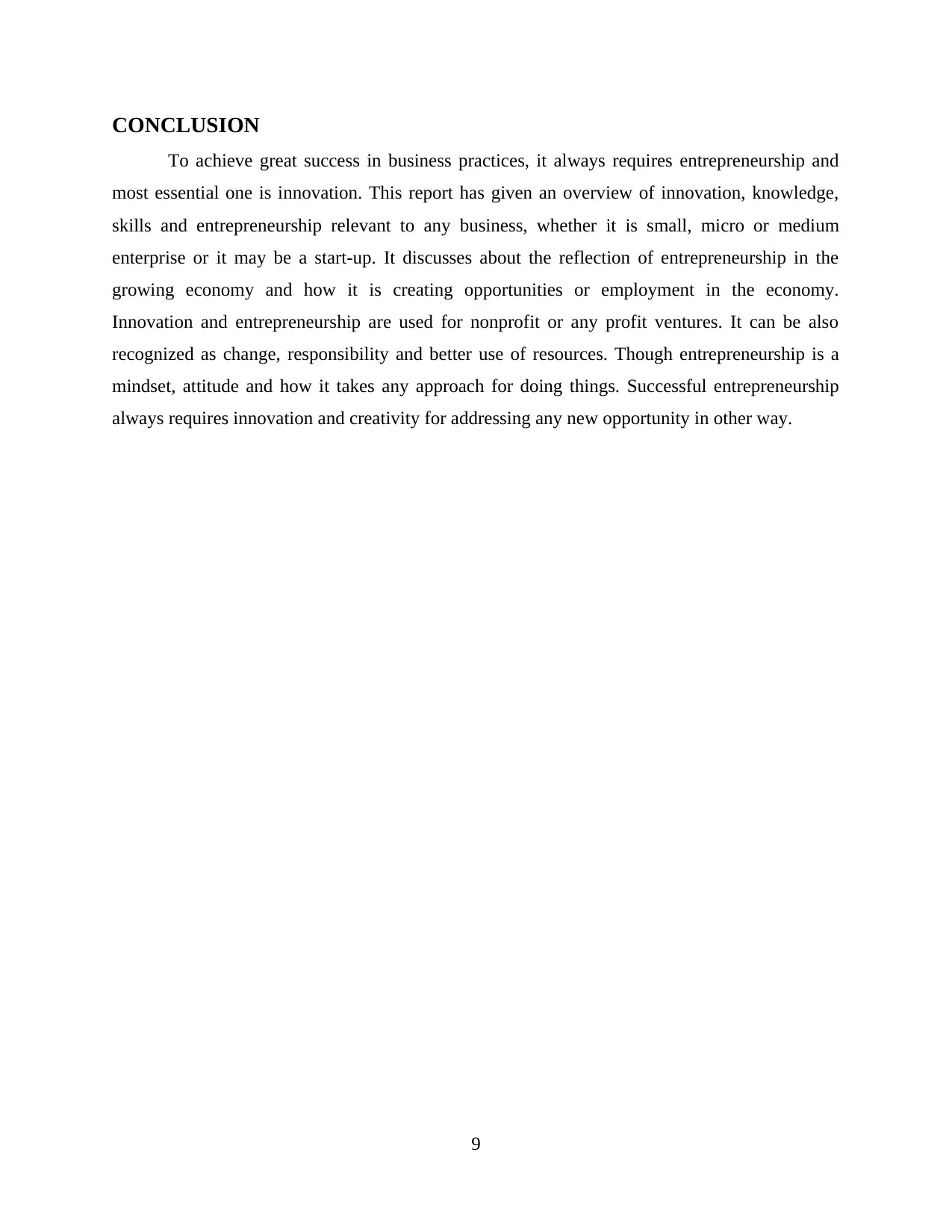
CONCLUSION
To achieve great success in business practices, it always requires entrepreneurship and
most essential one is innovation. This report has given an overview of innovation, knowledge,
skills and entrepreneurship relevant to any business, whether it is small, micro or medium
enterprise or it may be a start-up. It discusses about the reflection of entrepreneurship in the
growing economy and how it is creating opportunities or employment in the economy.
Innovation and entrepreneurship are used for nonprofit or any profit ventures. It can be also
recognized as change, responsibility and better use of resources. Though entrepreneurship is a
mindset, attitude and how it takes any approach for doing things. Successful entrepreneurship
always requires innovation and creativity for addressing any new opportunity in other way.
9
To achieve great success in business practices, it always requires entrepreneurship and
most essential one is innovation. This report has given an overview of innovation, knowledge,
skills and entrepreneurship relevant to any business, whether it is small, micro or medium
enterprise or it may be a start-up. It discusses about the reflection of entrepreneurship in the
growing economy and how it is creating opportunities or employment in the economy.
Innovation and entrepreneurship are used for nonprofit or any profit ventures. It can be also
recognized as change, responsibility and better use of resources. Though entrepreneurship is a
mindset, attitude and how it takes any approach for doing things. Successful entrepreneurship
always requires innovation and creativity for addressing any new opportunity in other way.
9
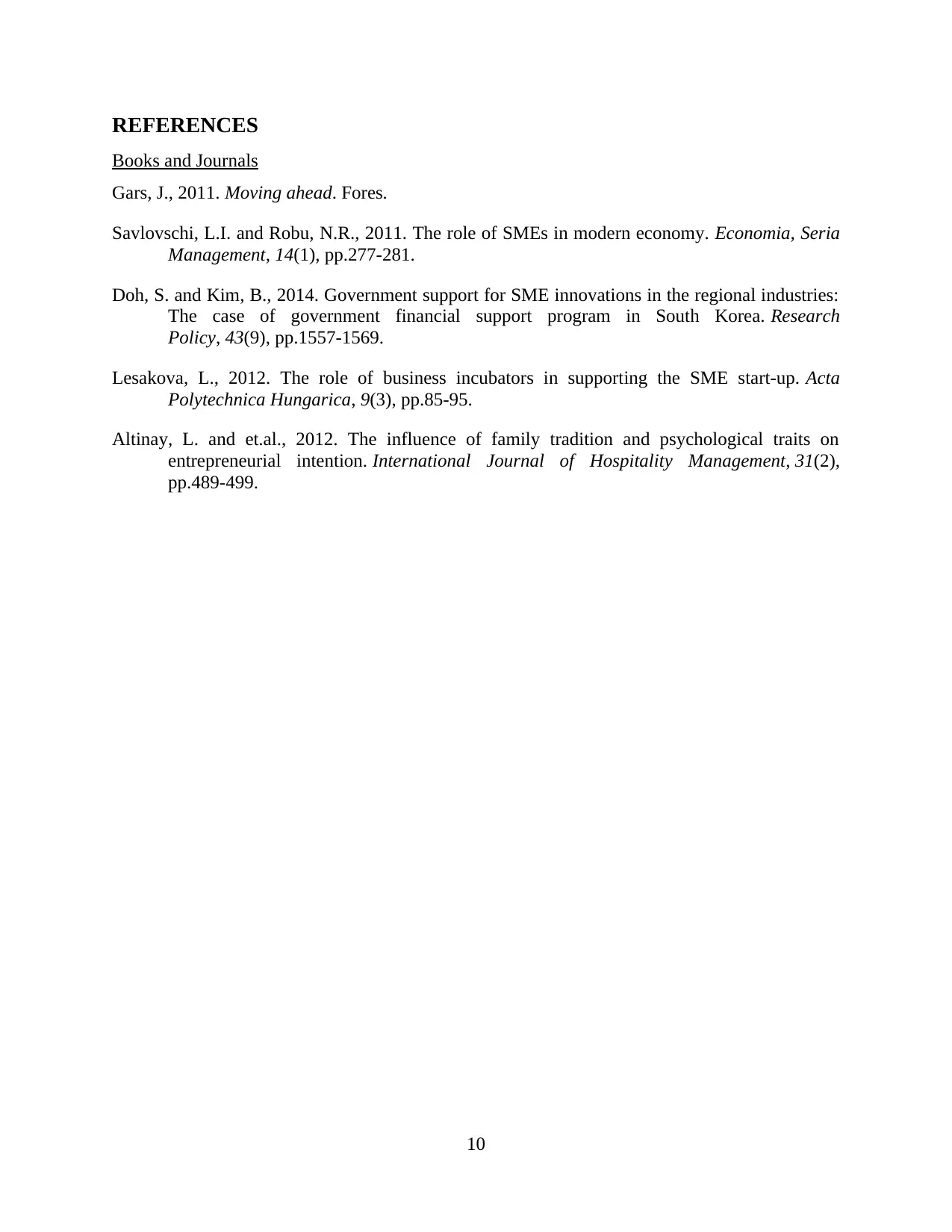
REFERENCES
Books and Journals
Gars, J., 2011. Moving ahead. Fores.
Savlovschi, L.I. and Robu, N.R., 2011. The role of SMEs in modern economy. Economia, Seria
Management, 14(1), pp.277-281.
Doh, S. and Kim, B., 2014. Government support for SME innovations in the regional industries:
The case of government financial support program in South Korea. Research
Policy, 43(9), pp.1557-1569.
Lesakova, L., 2012. The role of business incubators in supporting the SME start-up. Acta
Polytechnica Hungarica, 9(3), pp.85-95.
Altinay, L. and et.al., 2012. The influence of family tradition and psychological traits on
entrepreneurial intention. International Journal of Hospitality Management, 31(2),
pp.489-499.
10
Books and Journals
Gars, J., 2011. Moving ahead. Fores.
Savlovschi, L.I. and Robu, N.R., 2011. The role of SMEs in modern economy. Economia, Seria
Management, 14(1), pp.277-281.
Doh, S. and Kim, B., 2014. Government support for SME innovations in the regional industries:
The case of government financial support program in South Korea. Research
Policy, 43(9), pp.1557-1569.
Lesakova, L., 2012. The role of business incubators in supporting the SME start-up. Acta
Polytechnica Hungarica, 9(3), pp.85-95.
Altinay, L. and et.al., 2012. The influence of family tradition and psychological traits on
entrepreneurial intention. International Journal of Hospitality Management, 31(2),
pp.489-499.
10
1 out of 12
Related Documents
Your All-in-One AI-Powered Toolkit for Academic Success.
+13062052269
info@desklib.com
Available 24*7 on WhatsApp / Email
![[object Object]](/_next/static/media/star-bottom.7253800d.svg)
Unlock your academic potential
© 2024 | Zucol Services PVT LTD | All rights reserved.





